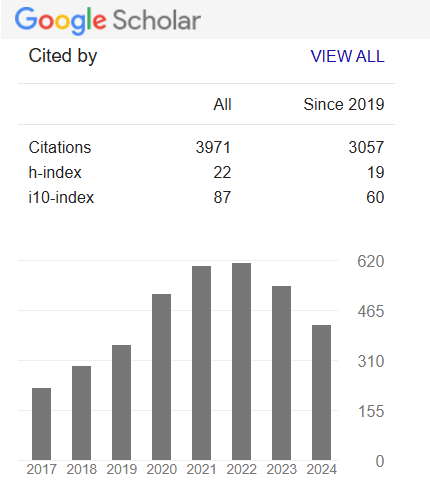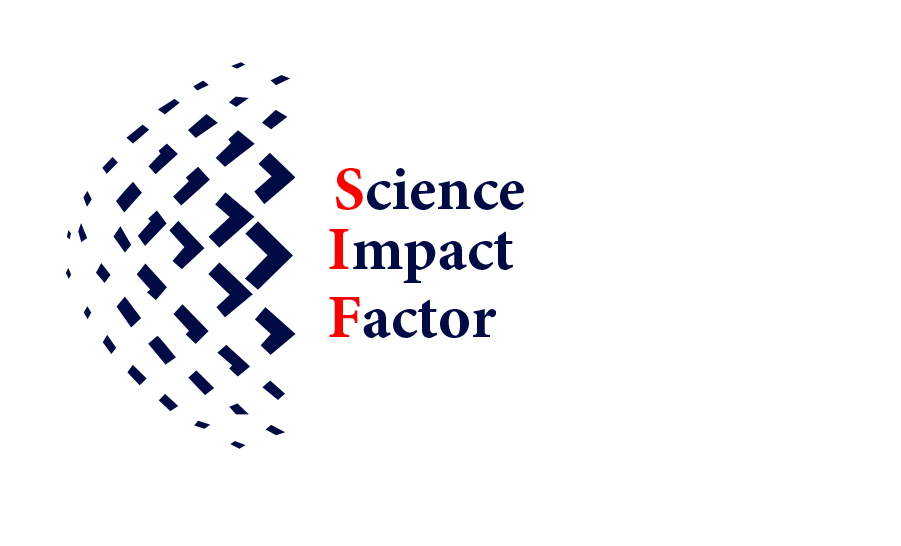Role of apoptotic pathways in treating pancreatic cancer using natural compounds
Keywords:
Natural compounds, Anticancer, Apoptotic pathway, Heterogeneous diseaseAbstract
Pancreatic cancer is becoming most common cancer in the world wide having less treatment option with high death rate. Traditional compounds are chemical compounds isolated from natural/herbal plants. They have less side effects or no side effect and play an important role as anticancer agent in treatment. These having various natural compounds /substances that may involve in the action of different molecular pathways in apoptotic pathway like curcumin, capsaicin, triptolide, EGCG, ursolic acid etc. These natural compound having ability to suppress development of the pancreatic cancer by the mechanism of signaling pathways such as K-Ras, NFқB, MAPK, P12K, AKT, P53, JAK & STAT. This review deals with use of natural compounds as a source of anticancer with potential mechanisms of apoptotic pathways.
Downloads
References
Acharya A, Das I, Chandhok D, Saha T. (2010) Redox regulation in cancer: a double-edged sword with therapeutic potential. Oxid Med Cell Longev, 3:23–34
Arora S, Bhardwaj A, Srivastava SK, Singh S, McClellan S, Wang B, et al. (2011) Honokiol arrests cell cycle, induces apoptosis, and potentiates the cytotoxic effect of gemcitabine in human pancreatic cancer cells. PLoS ONE, 6:e21573
Barkett M, Gilmore TD (1999) Control of apoptosis by Rel/NF-kappaB transcription factors. Oncogene, 18:6910–6924.
Bayraktar S, Bayraktar UD, Rocha-Lima CM (2010) Recent developments in palliative chemotherapy for locally advanced and metastatic pancreas cancer. World J Gastroenterol, 16:673–682
Borja-Cacho D, Yokoyama Y, Chugh RK, Mujumdar NR, Dudeja V, Clawson KA, et al. (2010) TRAIL and triptolide: an effective combination that induces apoptosis in pancreatic cancer cells. J Gastrointest Surg, 14:252–260
Cagnol S, Chambard JC (2010) ERK and cell death: mechanisms of ERK-induced cell death—apoptosis, autophagy and senescence. FEBS J, 277: 2–21
Chakravarthy R, Clemens MJ, Pirianov G, Perdios N, Mudan S, Cartwright JE, et al. (2013) Role of the eIF4E binding protein 4E-BP1 in regulation of the sensitivity of human pancreatic cancer cells to TRAIL and celastrol-induced apoptosis. Biol Cell, 105:414–29
Dhillon AS, Hagan S, Rath O, Kolch W. (2007) MAP kinase signalling pathways in cancer. Oncogene , 26:3279–3290.
Downward J. (1998) Ras signalling and apoptosis Curr Opin Genet Dev, 8:49–54
Ghaneh P, Kawesha A, Evans JD, Neoptolemos JP (2002) Molecular prognostic markers in pancreatic cancer. J Hepatobiliary Pancreat Surg, 9:1–11.
Glienke W, Maute L, Wicht J, Bergmann L (2009) Curcumin inhibits constitutive STAT3 phosphorylation in human pancreatic cancer cell lines and down regulation of survivin/BIRC5 gene expression. Cancer Invest, 28:166–171.
Hariharan D, Saied A, Kocher (2008) HM Analysis of mortality rates for pancreatic cancer across the world. HPB, 10:58–62.
Hidaka H, Ishiko T, Furuhashi T, Kamohara H, Suzuki S, Miyazaki M, et al. (2002) Curcumin inhibits interleukin 8 production and enhances interleukin 8 receptor expression on the cell surface.Cancer, 95:1206–1214.
Hutzen B, Friedman L, Sobo M, Lin L, Cen L, De Angelis S, et al. (2009) Curcumin analogue GO-Y030 inhibits STAT3 activityand cell growth in breast and pancreatic carcinomas. Int. J. Oncol, 35:867–872.
Ihle JN. (1996) STATs: signal transducers and activators of transcription. Cell, 84:331–334.
Johnson J, de Mejia EG. (2011) Dietary factors and pancreatic cancer: the role of food bioactive compounds. Mol Nutr Food Res, 55:58–73
Khanbolooki S, Nawrocki ST, Arumugam T, Andtbacka R, Pino MS, Kurzrock R, et al. (2006) Nuclear factor-kappaB maintains TRAIL resistance in human pancreatic cancer cells. Mol Cancer Ther, 5:2251–2260.
Lau ST, Lin ZX, Leung PS. (2010) Role of reactive oxygen species in brucein Dmediated p38-mitogen-activated protein kinase and nuclear factor-kappaB signalling pathways in human pancreatic adenocarcinoma cells. Br J Cancer, 102:583–593.
Lau ST, Lin ZX, Liao Y, Zhao M, Cheng CH, Leung PS, et al. (2009) Induces apoptosis in pancreatic adenocarcinoma cell line PANC-1 through the activation of p38-mitogen activated protein kinase. Cancer Lett, 281:42–52.
Li C, Yang Z, Zhai C, Qiu W, Li D, Yi Z, et al. (2010) Maslinic acid potentiates the antitumor activity of tumor necrosis factor alpha by inhibiting NF-kappaB signaling pathway. Mol Cancer, 9:73
Li J, Liang X, Yang X (2012) Ursolic acid inhibits growth and induces apoptosis in gemcitabine-resistant human pancreatic cancer via the JNK and PI3K/Akt/NFkappaB pathways. Oncol Rep 28:501–510.
Li J, Wientjes MG, Au JL (2010) Pancreatic cancer: Pathobiology, treatment options, and drug delivery. AAPS J, 12:223–232
Li L, Yue GG, Lau CB, Sun H, Fung KP, Leung PC, et al. (2012) induces apoptosis and cell cycle arrest in pancreatic adenocarcinoma cells through caspase- and p53-dependent pathways. Toxicol Appl Pharmacol, 262:80–90.
Lin Li, Po Sing Leung* (2014) Use of herbal medicines and natural products: An alternative approach to overcoming the apoptotic resistance of pancreatic cancer . The Internt J.of Bioche. & Cell Bio., 53:224–236
Long J, Zhang Y, Yu X, Yang J, LeBrun DG, Chen C, et al. (2011) Overcoming drug resistance in pancreatic cancer. Expert Opin Ther Targets, 15:817–828
Ma JX, Sun YL,Wang YQ,Wu HY, Jin J, YuXF. (2013) Triptolide induces apoptosis and inhibits the growth and angiogenesis of human pancreatic cancer cells by downregulating COX-2 and VEGF. Oncol Res, 20:359–68.
Mo W, Xu X, Xu L, Wang F, Ke A, Wang X, et al. (2011) Resveratrol inhibits proliferation and induces apoptosis through the hedgehog signaling pathway in pancreatic cancer cell. Pancreatology, 11:601–609.
Nio Y, Dong M, Uegaki K, Hirahara N, Minari Y, Sasaki S, et al. (1998) p53 expression affects the efficacy of adjuvant chemotherapy after resection of invasive ductal carcinoma of the pancreas. Anticancer Res, 18:3773–3779
Olson JM, Hallahan (2004) AR. p38 MAP kinase: a convergence point in cancer therapy. Trends Mol Med, 10:125–9.
Ouyang L*,a,Luo† Y,a, Tian M*,a, Zhang*SY, Lu‡ R, Wang§ JH et al (2014) Plants natural products from traditional compounds to new emerging drugs in cancer therapy, cell prolif, 47:506-515
Ouyang H, Wang P, Meng Z, Chen Z, Yu E, Jin H, et al. (2011) Multimodality treatment of pancreatic cancer with liver metastases using chemotherapy, radiation therapy, and/or Chinese herbal medicine. Pancreas, 40:120–5
Pericleous M, Rossi RE, Mandair D, Whyand T, Caplin ME. (2014) Nutrition and pancreatic cancer. Anticancer Res, 34:9–21
Phillips PA, Dudeja V, McCarroll JA, Borja-Cacho D, Dawra RK, Grizzle WE, et al. (2007) Triptolide induces pancreatic cancer cell death via inhibition of heat shock protein 70. Cancer Res, 67:9407–9416.
Pramanik KC, Srivastava SK (2012) Apoptosis signal-regulating kinase 1-thioredoxin complex dissociation by capsaicin causes pancreatic tumor growth suppression by inducing apoptosis. Antioxid Redox Signal, 17:1417–32.
Qanungo S, Das M, Haldar S, Basu A (2005) Epigallocatechin-3- gallate induces mitochondrial membrane depolarization and caspase- dependent apoptosis in pancreatic cancer cells. Carcinogenesis, 26:958–967.
Roy SK, Chen Q, Fu J, Shankar S, Srivastava RK (2011) Resveratrol inhibits growth of orthotopic pancreatic tumors through activation of FOXO transcription factors. PLoS One 6, e25166
Roy SK, Srivastava RK, Shankar S (2010) Inhibition of PI3K/AKT and MAPK/ERK pathways causes activation of FOXO transcription factor, leading to cell cycle arrest and apoptosis in pancreatic cancer. J Mol Signal, 5:10
Saad B, Azaizeh H, Said O. (2005) Tradition and perspectives of arab herbal medicine:. Evid Based Complement Alternat Med, 2:475–479.
Sahu R, Batra S, Srivastava S (2009) Activation of ATM/Chk1 by Curcumin causes cell cycle arrest and apoptosis in human pancreatic cancer cells. Br. J. Cancer , 100:1425–1433.
Sahu RP, Srivastava SK. (2009) The role of STAT-3 in the induction of apoptosis in pancreatic cancer cells by benzyl isothiocyanate. J Natl Cancer Inst, 101:176–93
Schuler M, Green DR. (2001) Mechanisms of p53-dependent apoptosis. Biochem Soc Trans, 29:684–8
Seer.cancer gov/statfacts/html/pancreas.html
Siengel R, Naishadham D, Jemal (2012) A Review Cancer Statistics, 2012,CA cancer J Clin, 62:10-29
Shah SA, Potter MW, Hedeshian MH, Kim RD, Chari RS, Callery MP (2001) PI-3 kinase and NF-kappaB cross-signaling in human pancreatic cancer cells. J Gastrointest Surg, 5:603–12.
Shankar S, Suthakar G, Srivastava RK (2007) Epigallocatechin-3-gallate inhibits cell cycle and induces apoptosis in pancreatic cancer. Front. Biosci, 12:5039–5051.
Sharifi-Rad J,*Ozleyen A, Tumer TB,*Adetunji CO, Omari NE, Balahbib A et al (2019) Natural Products and Synthetic Analogs as a Source of Antitumor Drugs Biomolecules, 9,679,doi:10.339/biom9110679
Shen L, Kim SH, Chen CY. (2012) Sensitization of human pancreatic cancer cells harboring mutated K-ras to apoptosis. PLoS ONE, 7:e40435
Sun W, Wang W, Kim J, Keng P, Yang S, Zhang H, et al. (2008) Anti-cancer effect of resveratrol is associated with induction of apoptosis via a mitochondrial pathway alignment. Adv. Exp. Med. Biol, 614:179–186.
Sung B, Park B, Yadav VR, Aggarwal BB. (2010) Celastrol, a triterpene, enhances TRAILinduced apoptosis through the down-regulation of cell survival proteins and up-regulation of death receptors. J Biol Chem, 285:11498–11507
Tang SN, Fu J, Nall D, Rodova M, Shankar S, Srivastava RK (2012) Inhibition of sonic hedgehog pathway and pluripotency maintaining factors regulate human pancreatic cancer stem cell characteristics. Int. J. Cancer, 131:30–40.
Tang XP, Tang GD, Fang CY, Liang ZH, Zhang LY. (2013) Effects of ginsenoside Rh2 on growth and migration of pancreatic cancer cells. World J Gastroenterol, 19:1582–1592
Thoennissen NH, Iwanski GB, Doan NB, Okamoto R, Lin P, Abbassi S, et al. (2009); Cucurbitacin B induces apoptosis by inhibition of the JAK/STAT pathway and potentiates antiproliferative effects of gemcitabine on pancreatic cancer cells. Cancer Res, 69:5876–5884
Toyonaga T, Nakano K, Nagano M, Zhao G, Yamaguchi K, Kuroki S, et al. (2003) Blockade of constitutively activated Janus kinase/signal transducer and activator of transcription-3 pathway inhibits growth of human pancreatic cancer. Cancer Lett, 201:107–116.
Wang J, Zhang W, Sun L, Yu H, Ni QX, Risch HA, et al. (2012) Green tea drinking and risk of pancreatic cancer: a large-scale, population-based case–control study in urban Shanghai. Cancer Epidemiol, 36:e354–358.
Wang W, Rayburn ER, Zhao Y, Wang H, Zhang R. (2009) Novel ginsenosides 25-OH-PPD and 25-OCH3-PPD as experimental therapy for pancreatic cancer: anticancer activity and mechanisms of action. Cancer Lett, 278:241–248.
Westphal S, Kalthoff H (2003) Apoptosis :targets in pancreatic cancer. Mol Cancer; 2:6.
Yu JH, Kim H. (2012) Role of janus kinase/signal transducers and activators of transcription in the pathogenesis of pancreatitis and pancreatic cancer. Gut Liver 6:417–422
Zavoral M, Minarikova P, Zavada F, Salek C, Minarik M. (2011) Molecular biology of pancreatic cancer. World J Gastroenterol, 17:2897–2908
Zhang L, Pang E, Loo RRO, Rao J, Go VLW, Loo JA, et al. (2011) Concomitant inhibition of HSP90, its mitochondrial localized homologue TRAP1 and HSP27 by green tea in pancreatic cancer HPAF-II cells. Proteomics, 11:4638–4647.
Zhang JH, Lai FJ, Chen H, Luo J, Zhang RY, Bu HQ, et al. (2013) Involvement of the phosphoinositide 3-kinase/Akt pathway in apoptosis induced by capsaicin in the human pancreatic cancer cell line PANC-1. Oncol Lett, 5:43–48
Zhang R, Humphreys I, Sahu RP, Shi Y, Srivastava SK. (2008) In vitro and in vivo induction of apoptosis by capsaicin in pancreatic cancer cells is mediated through ROS generation and mitochondrial death pathway. Apoptosis 13:1465–1478
Zhang T, Hamza A, Cao X, Wang B, Yu S, Zhan CG, et al. (2008) A novel Hsp90 inhibitor to disrupt Hsp90/Cdc37 complex against pancreatic cancer cells. Mol Cancer Ther, 7:162–170.
Zhang Y, Chen AY, Li M, Chen C, Yao Q. (2008) Ginkgo biloba extract kaempferol inhibits cell proliferation and induces apoptosis in pancreatic cancer cells. J Surg Res; 148:17–23.
Downloads
Published
How to Cite
Issue
Section
License
Copyright (c) 2021 Tushar Kumar, Neeraj, Runjhun Mathur, Abhimanyu Kumar Jha

This work is licensed under a Creative Commons Attribution-NonCommercial-NoDerivatives 4.0 International License.
Open Access This article is licensed under a Creative Commons Attribution 4.0 International License, which permits use, sharing, adaptation, distribution and reproduction in any medium or format, as long as you give appropriate credit to the original author(s) and the source, provide a link to the Creative Commons license, and indicate if changes were made. The images or other third party material in this article are included in the article’s Creative Commons license unless indicated otherwise in a credit line to the material. If the material is not included in the article’s Creative Commons license and your intended use is not permitted by statutory regulation or exceeds the permitted use, you will need to obtain permission directly from the copyright holder. To view a copy of this license, visit http://creativecommons.org/ licenses/by/4.0/











